|
|
|
Sort Order |
|
|
|
Items / Page
|
|
|
|
|
|
|
| Srl | Item |
| 1 |
ID:
168174
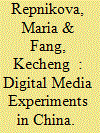

|
|
|
|
|
| Summary/Abstract |
With the rapid decline of traditional media in China, the party-state faces the growing challenge of shaping public opinion online. This article engages with one response to this challenge – a state-sanctioned digital media experiment aimed at creating a new form of journalism that appeals to the public and helps to disseminate Party propaganda. We analyse the emergence of a national success story, Shanghai-based model media outlet Pengpai, and its diffusion across different regions. We argue that the synergy between local officials and media entrepreneurs has propelled Pengpai’s national fame. We further demonstrate that while there has been a cross-national attempt to diffuse this model, it has produced mixed results owing to a number of factors, including the superficial commitment of local officials and media professionals. These findings demonstrate that state-sanctioned decentralized experimentation can deliver unpredictable results in the sphere of media policy, and they further question the capacity of the party-state to effectively reinvent public persuasion in the digital age.
|
|
|
|
|
|
|
|
|
|
|
|
|
|
|
|
| 2 |
ID:
141729
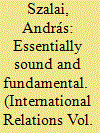

|
|
|
|
|
| Summary/Abstract |
Faced with the strategic uncertainties of the early nuclear age, the US Air Force (USAF) turned to civilian experts (defense rationalists) for help. Although the two communities shared the perception that science-based policies were required, the marriage of two distinct traditions – military and scientific – was not without conflict. Using an interpretivist approach, this article investigates this problematic reconciliation. It construes the realm of nuclear strategy-making as an interpretive enterprise where a multitude of ideas competed. Experts in this environment influenced policy decisions by rendering their ideas persuasive for their military ‘patrons’ through narrative framing devices. Within this conceptualization, bureaucratic dilemmas faced by the patron offered opportunities for experts to establish metaphorical correspondence between their tradition and the patron’s tradition. Such correspondence then lent ideas legitimacy and encouraged organizational support. As an illustration, an analysis is conducted on the role that hallmark RAND ideas on war limitation played in the so-called ‘counterforce’ debate in the early 1960s. This case suggests that the lasting impact of deterrence ideas had less to do with their correspondence to reality, than with their versatility as carriers of constructed ‘scientific’ and ‘rational’ storylines that gained traction within the USAF.
|
|
|
|
|
|
|
|
|
|
|
|
|
|
|
|
| 3 |
ID:
145085
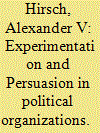

|
|
|
|
|
| Summary/Abstract |
Different beliefs about how to achieve shared goals are common in political organizations such as government agencies, campaigns, and NGOs. However, the consequences of such conflicts have not yet been explored. We develop a formal model in which a principal and an agent disagree about the right policy for achieving their shared goals. Disagreement creates a motivational problem, but we show how both observing policy outcomes and experimenting with policies can ameliorate it. We also show that the principal often defers to the agent in order to motivate him, thereby generating more informative policy outcomes and building future consensus. Most surprisingly, she sometimes allows the agent to implement his desired policy even when she is sure it is wrong, to persuade him through failure that he is mistaken. Using the model, we generate empirical implications about performance measurement and Presidential appointments in U.S. federal agencies.
|
|
|
|
|
|
|
|
|
|
|
|
|
|
|
|
| 4 |
ID:
106833
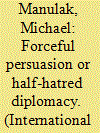

|
|
|
| 5 |
ID:
133256
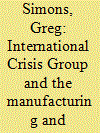

|
|
|
|
|
| Publication |
2014.
|
| Summary/Abstract |
The International Crisis Group (icg) has the motto 'working to prevent conflict worldwide'. As an organisation the icg occupies a very specific niche role, which is related to crises of a political nature, specifically armed conflict. While the icg employs a negative understanding of crisis, the academic definition of what a crisis may constitute is broader, as it can actually represent an opportunity for some actors. This article, written from a communication studies perspective, seeks to address how crises are manufactured in icg texts. It argues that the way in which crisis events are viewed and reacted to depends on the level of information and 'knowledge' that is produced and circulating about them. The article tackles the issue of the strategic level of the icg in terms of its means and mechanisms of attempting to project influence. It explores the different ploys and strategies used to influence policy makers, especially its communication strategy, the different values and ethics that are highlighted, and the 'causes' that are promoted.
|
|
|
|
|
|
|
|
|
|
|
|
|
|
|
|
| 6 |
ID:
157741


|
|
|
|
|
| Summary/Abstract |
The use of numbers has been remarkably effective at pressing global claims. While research has documented the historical processes through which numbers gained such prominence, and has examined the political and ethical consequences of this omnipresence, very little is known regarding the specific ways in which numbers create the outcomes that sustain governance. This article proposes to close that gap. Building on the literature that acknowledges that numbers not only describe things but also have profound impacts on things themselves, this article offers an integrated account of the working dynamics of numbers in the governance of security. To do so, the article identifies three distinct but connected vectors of power through which numbers shape security governance: persuasion, (de)politicisation, and standardisation. These insights are exemplified through the prism of different empirical examples, the variety of which aims to display the advantages of the approach we propose.
|
|
|
|
|
|
|
|
|
|
|
|
|
|
|
|
| 7 |
ID:
131854
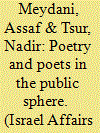

|
|
|
|
|
| Publication |
2014.
|
| Summary/Abstract |
Political poetry is not tested by its impact and the number of its readers but in its very participation in the public discourse on the issues of the day. Poetry moves between forces that focus the attention of its audience inwards, to the lyrics of the poems, and the forces that connect to the social, cultural, and political climate in which the poems are published. These movements reflect the power of poetry, which, using language, breaks the barriers that exist between people - individuals or groups, as well as between these individuals or groups and reality. This way, the poet serves as the element that formulates the informal cultural feelings in society and offers an interpretive package of the existing reality, as well as the alternative reality. Poets place their 'truth' within the perception of reality, and this truth can compete in the public arena with the 'truth' that is portrayed by politicians.
|
|
|
|
|
|
|
|
|
|
|
|
|
|
|
|
| 8 |
ID:
160459
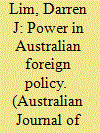

|
|
|
|
|
| Summary/Abstract |
The 2017 Foreign Policy White Paper emphasises the importance of ‘maximising’ Australia’s power and influence. However, the White Paper and much of the commentary on Australian foreign policy do not clearly conceptualise ‘power’ or indicate how it ought to be increased. The Lowy Institute’s recent Asia Power Index implies one possible strategy via its resource-based approach to measuring power. We outline a different approach and argue that power should be conceptualised and evaluated as a specific relationship causing behavioural change, rather than as a general attribute of its wielder. To complement the Lowy Institute’s carefully catalogued database, and facilitate a more focused conversation about maximising power and influence in Australian foreign policy, we offer a typology identifying five pathways through which states can translate their material and non-material resources into outcomes that serve the national interest.
|
|
|
|
|
|
|
|
|
|
|
|
|
|
|
|
| 9 |
ID:
095319
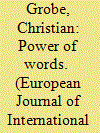

|
|
|
|
|
| Publication |
2010.
|
| Summary/Abstract |
Throughout the last two decades international negotiations have been predominantly analysed from the perspective of rationalist bargaining theory. But most recently, constructivists have pointed to a different mechanism that may facilitate agreement among multiple parties: processes of argumentation. Indeed, numerous empirical studies were successful in showing that words have the power to change the initial bargaining position of an actor and thereby impact on the outcome of multilateral negotiations. Rationalists have so far been unable to capture this important role of argumentative talk within their conceptual framework. Therefore, this article introduces a theory of rational persuasion, which I call functional persuasion theory. According to this theory argument-based changes in bargaining positions are entirely belief-driven and are not due to a reformulation of agents' preferences, as constructivists hold. The explanatory power of functional persuasion theory is demonstrated in the empirical part of this article by testing it against the most prominent constructivist explanations of argumentative persuasion.
|
|
|
|
|
|
|
|
|
|
|
|
|
|
|
|
| 10 |
ID:
075339
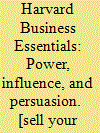

|
|
|
|
|
| Publication |
Boston, Harvard Business School Press, 2005.
|
| Description |
xv, 168p.Pbk
|
| Standard Number |
0070656517
|
|
|
|
|
|
|
|
|
|
|
|
Copies: C:1/I:0,R:0,Q:0
Circulation
| Accession# | Call# | Current Location | Status | Policy | Location |
| 052012 | 658.4092/HAR 052012 | Main | On Shelf | General | |
|
|
|
|
| 11 |
ID:
087848
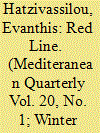

|
|
|
|
|
| Publication |
2009.
|
| Summary/Abstract |
The negotiating position of an international player is strengthened when it can persuade third parties that it has reached the limits of its concessions. However, from 1945 to 2004 the Greek side (both Athens and Nicosia) managed convincingly to convey this message to the international community only twice: in 1958, prior to the conclusion of the agreements for Cypriot independence, and in 2004, when the Annan Plan was rejected by the Greek-Cypriot community. This failure of the Greek side should be attributed to a combination of maximalism, lack of accurate assessments of the interests and objectives of other actors, and lack of consistency in Greek discourse.
|
|
|
|
|
|
|
|
|
|
|
|
|
|
|
|
| 12 |
ID:
102781
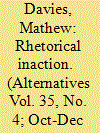

|
|
|
| 13 |
ID:
076862
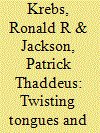

|
|
|
|
|
| Publication |
2007.
|
| Summary/Abstract |
While scholars of International Relations and comparative politics have usually treated rhetoric as epiphenomenal, one strand of constructivism has recently returned rhetoric to the heart of political analysis, especially through the mechanism of persuasion. We too maintain that rhetoric is central to political processes and outcomes, but we argue that persuasion is theoretically and methodologically problematic. We aver that rhetoric's role may be more usefully conceptualized in the context of coercion, and we advance a stylized model that illustrates how rhetorical coercion operates, explains why it works, and identifies key scope conditions. We subsequently illustrate our model's relevance through a detailed examination of a 'hard' case. This article's agenda is twofold. First, it advises scholars in these fields to avoid focusing on unanswerable questions about actors' motives and to examine instead what actors say, in what contexts, and to what audiences. Second, it lays the groundwork for a 'coercive constructivism', complementing the liberal version so prevalent today
|
|
|
|
|
|
|
|
|
|
|
|
|
|
|
|
| 14 |
ID:
128230
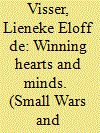

|
|
|
|
|
| Publication |
2013.
|
| Summary/Abstract |
Efforts at winning hearts and minds (WHAM) impact on and are affected by perceptions of legitimacy. In the Namibian war for independence (1966-1989) efforts of the South African counterinsurgent forces at winning hearts and minds focused mainly on persuading the population to cooperate in exchange for material benefits and services. The article demonstrates that this successfully contributed to a dimension of legitimacy that is conceptualized as pragmatic legitimacy. However, other dimensions of legitimacy are identified in which the South Africans were lacking, that is in moral, legal, and identity-based legitimacy. Furthermore, in areas where control was contested and where the population could not be shielded from insurgent intimidation, it is argued that the effects of coercion outweighed legitimacy altogether.
|
|
|
|
|
|
|
|
|
|
|
|
|
|
|
|
|
|
|
|
|